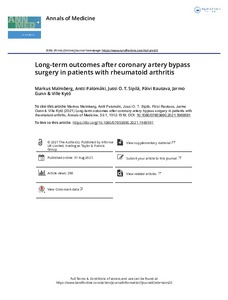Hae
Aineistot 1-10 / 19
Long-Term Outcomes of Surgical Aortic Valve Replacement in Patients with Rheumatoid Arthritis
Background: Patients with rheumatoid arthritis (RA) have increased risk of developing cardiovascular disease and events. Little is, however, known about the influence of RA to the outcomes after surgical aortic valve ...
Dietary Intervention in Infancy and Cognitive Function in Young Adulthood: The Special Turku Coronary Risk Factor Intervention Project
<p><strong>Objective: </strong>Consumption of saturated fatty acids (SAFAs), polyunsaturated fatty acids (PUFAs), cholesterol, and fiber have been linked with cognitive function in adults. We evaluated these associations ...
Trends in the surgical management of vesicoureteral reflux in Finland in 2004-2014
<p>Objectives: Previous data on the trends of surgical treatment of vesicoureteral reflux outside USA are<br />scarce. The aim of this study was to clarify the national trends of operative treatment of vesicoureteral<br ...
Sex Differences in Cardiovascular Outcomes of Older Adults After Myocardial Infarction
<p>Background Evidence on the impact of sex on prognoses after myocardial infarction (MI) among older adults is limited. We evaluated sex differences in long-term cardiovascular outcomes after MI in older adults. Methods and Results All patients with MI ≥70 years admitted to 20 Finnish hospitals during a 10-year period and discharged alive were studied retrospectively using a combination of national registries (n=31 578, 51% men, mean age 79). The primary outcome was combined major adverse cardiovascular event within 10-year follow-up. Sex differences in baseline features were equalized using inverse probability weighting adjustment. Women were older, with different comorbidity profiles and rarer ST-segment-elevation MI and revascularization, compared with men. Adenosine diphosphate inhibitors, anticoagulation, statins, and high-dose statins were more frequently used by men, and renin-angiotensin-aldosterone inhibitors and beta blockers by women. After balancing these differences by inverse probability weighting, the cumulative 10-year incidence of major adverse cardiovascular events was 67.7% in men, 62.0% in women (hazard ratio [HR], 1.17; CI, 1.13-1.21; P<0.0001). New MI (37.0% in men, 33.1% in women; HR, 1.16; P<0.0001), ischemic stroke (21.1% versus 19.5%; HR, 1.10; P=0.004), and cardiovascular death (56.0% versus 51.1%; HR, 1.18; P<0.0001) were more frequent in men during long-term follow-up after MI. Sex differences in major adverse cardiovascular events were similar in subgroups of revascularized and non-revascularized patients, and in patients 70 to 79 and ≥80 years. Conclusions Older men had higher long-term risk of major adverse cardiovascular events after MI, compared with older women with similar baseline features and evidence-based medications. Our results highlight the importance of accounting for confounding factors when studying sex differences in cardiovascular outcomes.</p>...
Attainment of Targets of the 20-Year Infancy-Onset Dietary Intervention and Blood Pressure Across Childhood and Young Adulthood The Special Turku Coronary Risk Factor Intervention Project (STRIP)
We examined whether success in achieving the key targets of an infancy-onset 20-year dietary intervention was associated with blood pressure (BP) from infancy to young adulthood. In the prospective randomized STRIP (Special ...
Sydän- ja verisuonitautien ehkäisy kannattaa aloittaa jo vauvasta - STRIP-tutkimus näyttää miksi ja miten
Satunnaistetussa STRIP-tutkimuksessa 562 tervettä lasta sai tyydyttyneen rasvan saannin vähentämiseen tähtäävää ravitsemusneuvontaa kahdeksan kuukauden iästä alkaen 20 vuoden ikään asti, ja 545 saman ikäistä lasta seurattiin ...
Short- and long-term outcomes of infective endocarditis admission in adults: A population-based registry study in Finland
<p>Infective endocarditis (IE) is associated with high mortality. However, data on factors associated with length of stay (LOS) in hospital due to IE are scarce. In addition, long-term mortality of more than 1 year is ...
An Infancy-Onset 20-Year Dietary Counselling Intervention and Gut Microbiota Composition in Adulthood
The randomized controlled Special Turku Coronary Risk Factor Intervention Project (STRIP) has completed a 20-year infancy-onset dietary counselling intervention to reduce exposure to atherosclerotic cardiovascular disease ...
Long-term outcomes after coronary artery bypass surgery in patients with rheumatoid arthritis
<p><strong>Objective: </strong>To investigate the long-term outcomes of coronary artery bypass grafting surgery (CABG) in patients with rheumatoid arthritis (RA).</p><p><strong>Methods: </strong>Patients with RA (n = 378) were retrospectively compared to patients without RA (n = 7560), all treated with CABG in a multicentre, population-based cohort register study in Finland. The outcomes were studied with propensity score-matching adjustment for baseline features. The median follow-up was 9.7 years.</p><p><strong>Results: </strong>Diagnosis of RA was associated with an increased risk of mortality after CABG compared to patients without RA (HR 1.50; CI 1.28-1.77; p < .0001). In addition, patients with RA were in higher risk of myocardial infarction during the follow-up period (HR 1.61; CI 1.28-2.04; p < .0001). Cumulative rate of repeated revascularization after CABG was 14.4% in RA patients and 12.0% in control patients (p = .060). Duration of RA before CABG (p = .011) and preoperative corticosteroid usage in RA (p = .041) were independently associated with higher mortality after CABG. There were no differences between the study groups in 30-d mortality or in the post-operative usage of cardiovascular medications.</p><p><strong>Conclusions: </strong>RA is independently associated with worse prognosis in coronary artery disease treated with CABG. Preoperative corticosteroid use and longer RA disease duration are additional risk factors for mortality.Key messagesPatients with rheumatoid arthritis (RA) have impaired long-term outcomes after coronary artery bypass surgery (CABG).Glucocorticoid use before CABG and duration of RA are associated with higher mortality.Special attention should be paid in secondary prevention of cardiovascular disease in RA patients after CABG.</p>...









